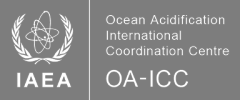
Ocean Acidification International Coordination Centre (OA-ICC)
The IAEA Ocean Acidification International Coordination Centre (OA-ICC) promotes international scientific collaboration and capacity building to support Member States in “minimizing and addressing ocean acidification,” the focus of Target 3 of Sustainable Development Goal (SDG) 14. Ocean acidification refers to the changes in seawater chemistry, including a decrease in pH, caused by the ocean’s absorption of excess carbon dioxide emissions. These changes create stress and challenges for marine life, affecting the growth, reproduction, and survival of many species. Ocean acidification threatens marine organisms and ecosystems that are crucial for social and economic well-being, including coral reefs that support tourism and provide coastal protection from storms, and shellfish that are critical to food security and seafood industries. While ocean acidification is a global problem, it varies locally and may have disproportionate impacts to certain communities, such as Small Island Developing States which rely heavily on the ocean for subsistence, livelihoods, and culture.
The OA-ICC empowers countries across the globe to monitor ocean acidification along their coasts, study the impacts on key local species, and adapt and respond to these environmental changes.
Ocean Acidification - Helping to Tackle this Global Threat with Nuclear Techniques
Ocean acidification, a detrimental consequence of climate change caused by the ocean’s absorption of CO2, is threatening the environment. Because of its global scale, addressing ocean acidification comes with its own challenges. The IAEA’s Environment Laboratories in Monaco overcome these challenges by utilizing nuclear and isotopic techniques to better understand the environmental and economic impacts of ocean acidification. With the help of these nuclear techniques, scientists can research potential solutions to this global issue.
OA-ICC Mission
The OA-ICC was established in 2013 as an IAEA Peaceful Uses Initiative project following increasing concern from IAEA Member States about ocean acidification. As world-wide research activities on ocean acidification and related stressors continue to develop, there is a clear need for effective global scientific cooperation. The OA-ICC is working to build a strong ocean acidification research community across the globe, providing access to training, tools, resources, and opportunities for regional and international networking and collaboration, directly supporting Member States in their initiatives to address SDG 14.3.
The OA-ICC promotes and facilitates international activities on ocean acidification through the thematic areas of science, capacity building, and communication. The Centre organizes training courses in Member States, provides access to data and resources to advance research, facilitates the development of standardized methodology and best practices, and raises awareness about the importance of addressing ocean acidification at global fora.
More recently, the OA-ICC’s activities have evolved to study ocean acidification in the context of other existing environmental stressors, such as ocean warming, oxygen loss, and pollution, and to assess how these combined threats affect biodiversity loss. The Centre is specifically supporting countries to respond to Target 8 of the new Kunming-Montreal Global Biodiversity Framework (GBF) which calls for countries to minimize the impact of climate change and ocean acidification on biodiversity. Additionally, the OA-ICC is promoting responsible and transparent research on the impacts of ocean-based solutions proposed to counter ocean acidification and climate change, in particular ocean alkalinity enhancement.
The Centre works closely with key partners such as the International Oceanographic Commission of UNESCO (UNESCO-IOC), the NOAA Ocean Acidification Program (NOAA OAP), and the Prince Albert II of Monaco Foundation (FPA2), and leading scientists in the field, notably from the SOLAS IMBeR Working Group on Ocean Acidification (SIOA).







